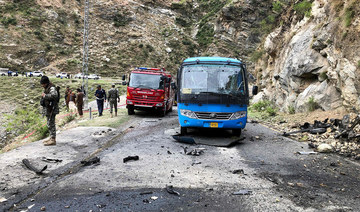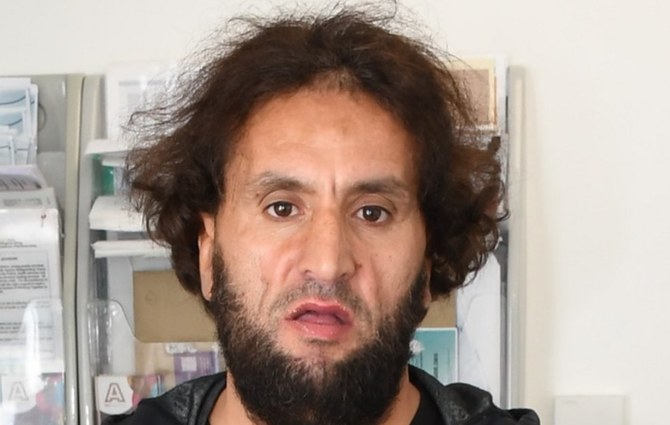NEW DELHI: Rallies in solidarity with Palestine have been ongoing in India for the past two weeks. Despite the fact that the majority of them have been dispersed by authorities, protesters believe they should still take to the streets in the wake of Israeli attacks on Gaza.
In the Indian capital alone, three rallies were stopped by police in the past week. During the latest one, on Friday, Arab News witnessed the arrest of dozens of demonstrators.
“It is important to protest. If you go back to 200 years before India got independence, we were fighting our battle,” N. Sai Balaji, former president of Jawaharlal Nehru University Students’ Union, who organized a protest in front of the Israeli embassy on Oct. 23, told Arab News.
“The Indian people fought British colonialism and we got freedom. We look at the Palestinians in the same way.”
Support for Palestine was an important part of India’s foreign policy even before independence from British colonial rule in 1947. Palestine was under British administration from 1920 to 1948.
Many years before the establishment of Israel, Mahatma Gandhi, the leader of India’s freedom movement, had opposed a Jewish nation-state in Palestine, deeming it inhumane.
“Mahatma Gandhi’s views were expressed at various times on this question, particularly when there was intense Jewish migration from Europe to Palestine in the first half of the 20th century, which later culminated in the establishment of the state of Israel in 1948,” Prof. A.K. Ramakrishnan from the Center for West Asian Studies at Jawaharlal Nehru University in New Delhi, told Arab News.
He cited an interview that Gandhi gave to the magazine Harijan in 1938: “He mentioned that Palestine belongs to Arabs in the same sense as England belongs to the English and France to the French. And that support was very important, even though there was tremendous pressure from the Jewish community and the World Zionist Organization on him to issue a statement in support of Jewish immigration and their agenda in Palestine.”
The stance of other Indian independence leaders was no different; India’s first prime minister Jawaharlal Nehru was dedicated to the Non-Aligned Movement, although it was his administration that eventually recognized Israel.
“After independence, the Indian government, under his leadership, recognized the state of Israel, but no fuller relationship was established,” Ramakrishnan said.
Nehru’s daughter Indira Gandhi, who became the third prime minister of India in 1966, had a close relationship with Yasser Arafat, the leader of the Palestine Liberation Organization, who often referred to her as his “elder sister.”
“That’s a clear example of how warm, how cordial, the relationship was back then,” said Dr. Amir Ali, assistant professor at the Centre for Political Studies at JNU, adding that, in the 1970s and 1980s, thousands of Palestinians studied at Indian universities and were welcomed by Indian society.
“Our relationship with the Arab world is that it’s always been very, very warm,” Ali continued, adding that it continues to be so, despite the clear change in India’s official policy since Prime Minister Narendra Modi took office in 2014.
According to Ali, however, that shift was underway long before Modi came to power.
“I think the major change happened in the 1990s, with liberalization. In 1992, we had (diplomatic) relations established with Israel,” Ali said. Since then, he continued, India has looked to balance its policy between Israel and Palestine, relegating the latter more to the background.
“Since 2014, there has been a definite change in India’s position,” said Prof. Sujata Ashwarya from the Centre for West Asian Studies at Jamia Millia Islamia in New Delhi, noting that, even though India has not gone as far as the US did in 2017 — recognizing Jerusalem as the capital of Israel — it no longer calls for East Jerusalem to be recognized as the capital of Palestine.
When Israel began its daily bombing of Gaza on Oct. 7, after an assault by the Gaza-based militant group Hamas, Modi stirred controversy by initially offering support for Israel.
He took to social media to say he was shocked by the “terrorist” attack and that India stood “in solidarity with Israel.”
Two days later, the Indian Ministry of External Affairs issued a statement saying that India had always advocated “negotiations towards establishing a sovereign, independent and viable state of Palestine.” But Modi’s post clearly encouraged Israel, whose ambassador to New Delhi, Naor Gilon, told reporters last week that he wanted India to recognize Hamas as a terrorist organization, a matter he had raised with the government.
Ashwarya said she was not surprised that the envoy felt he could try to pressure the Indian government, given Israel’s behavior on the international stage.
“When the UN secretary-general said there is a context to all the violence taking place in the region, Israel demanded that he resign,” she said. “Israel is emboldened because the entire Western world, which has all the military and economic power, is behind Israel. Israel has all the audacity because it is backed by everyone in the Western world.”
What the Israeli envoy missed, according to Ashwarya, was that the word “terrorist” in Modi’s post referred to the attack, rather than Hamas itself.
“He did not mean Hamas ... In India’s policy, Hamas is still not considered a terrorist organization,” she said. “As far as my understanding of foreign policy goes, India is not going to take any action in this regard. Not in the near future.”
Ashutosh Singh, assistant professor at Amity University in Noida, said any such move would prove problematic for India.
“Calling Hamas a terrorist organization will raise so many questions for Indians: Would you call Bhagat Singh a terrorist?” he said, referring to a hero of the early 20th-century Indian independence movement who was a vocal critic of British rule in India and was involved in two high-profile attacks on British authorities, which referred to him as a terrorist.
“Even people who don’t believe in the ideology of Hamas don’t call them terrorists; they will say they are militants, they’re freedom fighters,” he continued. “Although we don’t support them, we will never condemn them because they are freedom fighters.”


























